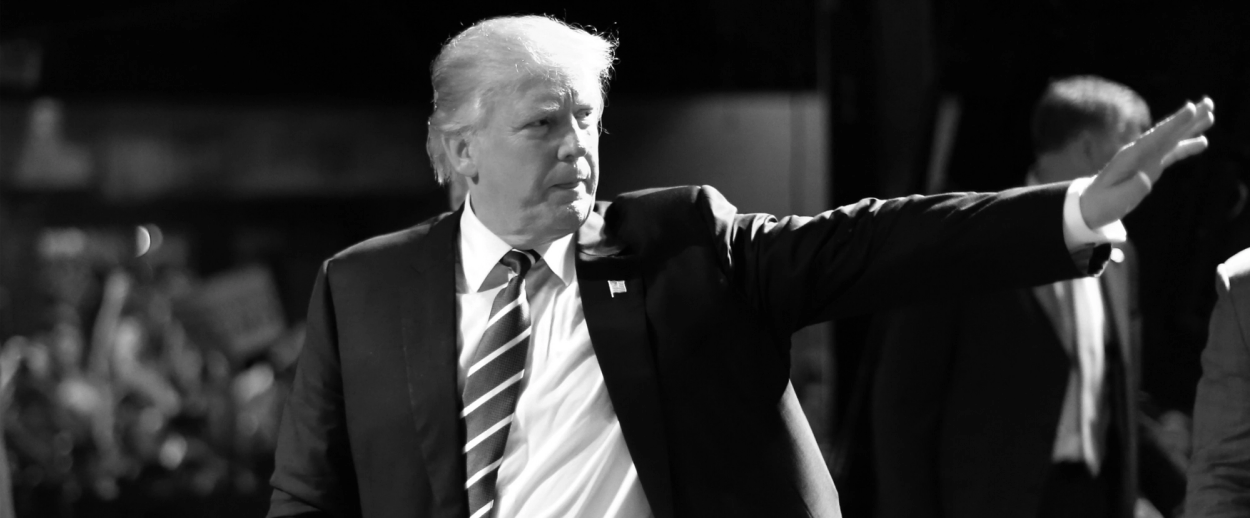A Year of Political Monstrosity
It’s been one year since Donald Trump announced his presidential bid, a prospect that grows ever scarier as the demagogue inches closer to the White House





One year ago, Donald J. Trump descended a gleaming golden escalator in the lobby of Trump Tower in New York City to announce his candidacy for president. “This is beyond anyone’s expectations,” he said that day, coining perhaps the secondary slogan of his campaign.
The year that followed has redefined the bounds of propriety in American political rhetoric and brought ugly sentiments to the surface in ways that have been shocking and disappointing. Often through his use of Twitter, Trump has inspired reveries in white nationalist and anti-Semitic circles as easily as he’s signaled eschaton to liberals and many conservatives.
At first, he was Donald Trump, that familiar self-aggrandizing real estate mogul/reality TV guy with funny hair and a historical penchant for making repulsive and ridiculous comments (e.g., that Barack Obama’s real name is Barry Soetoro). This, of course, morphed into train crash-level entertainment, and, as is the result of any joke that’s gone on too long, the knowing smiles at the expectation of his impending exit began to recede from the faces of those who never thought they’d be faced with a candidate who proposed banning immigration based on religious origins. And lashed out against women. And Mexicans.
With the general election just about five months away, the prospect of a Trump presidency is becoming an increasingly scary possibility. Trump’s rise to the highest office in the land is a prospect frightening enough that we’ve dedicated an entire series, and many features, to showing how just caustic and xenophobic Trump’s policies truly are. One shudders to think what a Trump presidency might actually look like. Are we prepared to elect a man, whose mostly commonly used epithet is “dopey,” be the person who handles complex, delicate foreign policy deliberations that not only affect America’s standing, but Israel’s as well?
Here’s a look at the low-lights of a year of would-be president Donald Trump, detailing how, particularly through media events, the former reality TV star and Obama birther became the presumed Republican candidate for the nation’s highest office.
June 16: Trump announced his candidacy for president, and hits on what come to be the major points of his campaign: Mexico, ISIS, China, the wall, and, of course, making America great again.
July 9: First major survey conducted by The Economist shows Trump leading the GOP pack.
July 18: Responding to criticism from John McCain, Trump said, “He’s not a war hero…I like people who weren’t captured.”
July 21: Trump gave out Lindsay Graham’s personal phone number to a crowd at his rally.
August 6: The first Republican debate. Trump refused to rule out a third party run and clarified that his misogyny is limited to Rosie O’Donnell. It was the most watched presidential primary debate ever, and the highest rated non-sports telecast in cable television history. (Related: Liel Liebowitz’s “Donald Trump, the Last of the Great Vaudevillians“)
August 8: Of Megyn Kelly, who had grilled him during the debate, Trump said: “There was blood coming out of her eyes, blood coming out of her wherever.” Thankfully, he soon clarified that “whatever” was referring to her nose.
August 21: A Mobile, Alabama, Trump rally drew 30,000 people.
August 20th: Trump labeled Jeb Bush “low-energy” for the first time, and from there on out, almost always refers to him as “Low-Energy Jeb.” Quick note re: middle school name-calling: Trump’s oddly good at finding the one trait someone is most publicly insecure about and creating the stickiest of nicknames. Goofy Elizabeth Warren, Lyin’ Ted, Crooked Hillary, Crazy Bernie, Little Marco…
November 21: Eight days after the Paris attacks, Trump claimed to have seen thousands of Muslims cheering the fall of the Twin Towers on 9/11.
November 22: Trump tweeted out racial crime statistics that Politifact categorized as “Pants On Fire”-level lies.
November 25: Upset at a negative comment, Trump appeared to have mocked disabled reporter Serge Kovaleski at a rally.
December 3: Just a day after he advocated for killing the families of terrorists, Trump told a crowd of Jewish donors that he’s “a negotiator, like you folks.”
December 7: In the wake of the San Bernadino shooting, Trump proposed a temporary shutdown on Muslims entering the US. Before this day, The Huffington Post had been filing all Trump stories under “entertainment.”
December 15: Jeb Bush, during a televised debate, said: “Donald, you’re not gonna be able insult your way to the presidency. (Unfortunately, Jeb, he just might.)
January 19: Trump is endorsed by Sarah Palin, whose been dubbed his ideological/performative foreberear.
January 23: Trump said: “I could stand in the middle of 5th Avenue and shoot somebody and I wouldn’t lose voters.”
February 7: Trump said he’d bring back “a hell of a lot worse than waterboarding.”
February 9: Trump won his first primary, in New Hampshire.
February 18: Trump on ISIS and the Pope: “If and when the Vatican is attacked by ISIS, which as everyone knows is ISIS’ ultimate trophy, I can promise you that the Pope would have only wished and prayed that Donald Trump would have been president because this would not have happened.”
February 23: About an ejected protester, Trump said: “I’d like to punch him the face.”
February 24: Trump is endorsed by David Duke. Trump tepidly disavowed him two days later, and does so more fully on the 28.
March 1—Tablet’s Trump Watch launched, on the same day Trump wins seven out of 11 states on Super Tuesday, (and also the same day as Chris Christie’s anguish).
March 4: Trump defended hand size, and his penis size.
March 17 – 23: Tablet devotes thousands of words to covering Trump’s appearance at AIPAC, calling for attendees to walk out. (Related: “Headless Community in Bottomless Spiral”; “Trump’s Transformation at AIPAC Should Scare You”; Trump Spoke. AIPAC Stood and Clapped.)
March 30: Trump suggested prison sentences for women who get abortions.
April 6: Ted Cruz won the Wisconsin primary, drawing closer to Trump in the polls than he’s been in weeks.
April 19: Trump won the New York primary. The race is essentially over at this point. Cruz definitely regretted his New York values comment right around this time.
May 3: Trump implied Ted Cruz’s father was friends with Lee Harvey Oswald the day that he assassinated JFK. Also happens to be day Cruz dropped out of the race. Kasich goes the next day.
May 11: Trump clarified that his proposed Muslim ban was “just a suggestion.”
May 26: Trump officially reached delegate threshold.
May 27: Trump on Federal Judge Gonzalo Curiel: “Everybody says it, but I have a judge who is a hater of Donald Trump, a hater. He’s a hater. His name is Gonzalo Curiel and he is not doing the right thing….So what happens is the judge, who happens to be, we believe, Mexican, which is great. I think that’s fine. You know what? I think the Mexicans are going to end up loving Donald Trump when I give all these jobs, OK?”
June 7: Trump broke the record for GOP primary popular vote—over 13 million.
June 12: Trump tweeted the following. Also reaffirms support for his suggested ban.
Appreciate the congrats for being right on radical Islamic terrorism, I don’t want congrats, I want toughness & vigilance. We must be smart!
— Donald J. Trump (@realDonaldTrump) June 12, 2016
June 14: Trump implied Obama has ISIS sympathies.
There you have it. One whole year of bombast and buffoonery, resulting in maybe the most popular GOP candidate in history. Now, he’ll more than likely face off against Hillary Clinton, who, at least for the moment, is leading him in the polls by a slim margin. While even Bernie Sanders has become to come around to Clinton, it doesn’t seem as if the Republican party will coalesce around Trump in the same way. And can you blame them?
Related: Trump Watch [Tablet series]
Jesse Bernstein is a former Intern at Tablet.